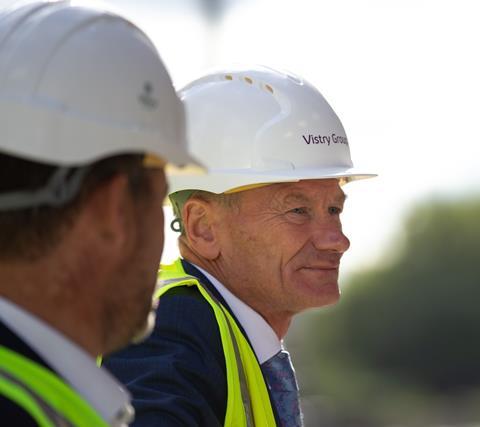Worries raised over combined role housebuilder’s boss holds
Vistry has been contacting shareholders to address concerns after one in five revolted against the re-election of boss Greg Fitzgerald as director of the company earlier this year.
In May, the housebuilder made Fitzgerald executive chair of the business in addition to chief executive – in a departure from the UK Corporate Governance Code.
This move has proved unpopular with some shareholders, with only 79% voting in favour of Fitzgerald’s re-election.

In an update today, the £4bn-turnover company said it understands the “primary concerns” of some shareholders are in relation to the combined role for Fitzgerald.
Vistry said Rob Woodward, appointed senior independent director earlier this year, has “held a series of calls with shareholders to establish…dialogue on the corporate governance arrangements”.
It said Woodward was appointed to provide “additional oversight on governance matters and serve as a point of communication for investors and board members”.
The company said it has also commissioned an external board evaluation, which will assess the combined role of CEO and chair, with the results published alongside its annual accounts due out on 6 March.
Vistry said it “remains committed to ongoing dialogue with shareholders and will continue to engage to ensure that the company understands shareholders’ views and is able to consider feedback”. It added this will “provide clarity on the company’s approach to succession planning going forward”.
>>See also: How worried should the sector be about Vistry?
>>See also: ‘I’m extremely demanding’: Greg Fitzgerald on delivering the Vistry growth plan
Vistry has issued two profit warnings in the last few weeks, with underestimated build costs meaning its adjusted pre-tax profit will be reduced by £165m over three years.
Earlier this month it said the problems are confined to its South division and can be attributed to “insufficient management capability, non-compliant commercial forecasting processes and poor divisional culture”.
The group said management in the south division “have stepped away from the business pending completion of formal processes” while it is reviewing organisation changes and “considering new appointments improving transparency, enhancing management capability, reducing the length of reporting lines and ensuring closer proximity of the CEO to the business”.




























No comments yet